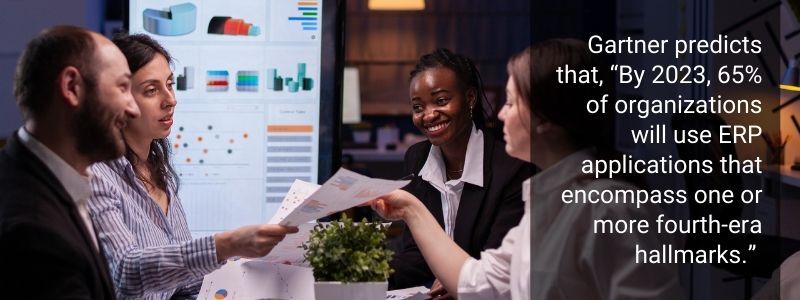The Rise of Fourth Era ERP and Why it has Caught Everyone's Attention?
New capabilities are continually getting added to ERP software. And with the fourth era of ERP, the system has made a more radical shift to an integrated, easier-to-use, and on-demand solution that would enhance business value and provide huge opportunities for growth.
The new generation system would be endowed with the ability to accomplish the following:
- Despite increasingly varied processes and data architectures, it would connect easily with other applications.
- Your core business functions would be enhanced to address functional gaps.
- Configuring it is simple and does not need custom coding or any form of special ERP implementation process. It would allow you to use built-in, native tools in the system to change its behaviour or features for meeting the business requirements.
- It would include a unique set of modules you need. This would make installing and maintaining the software hassle-free and less expensive.

What are the Six Aspects That Define a Fourth Era ERP According to Gartner?
The fourth-era enterprise resource planning system is going to have new features and capabilities that would move it into a wider ecosystem, encompassing customers, suppliers, partners, competitors, and even stakeholders.
Gartner predicts that, “By 2023, 65% of organizations will use ERP applications that encompass one or more fourth-era hallmarks.” To help you recognize and capitalize on this trend, we have listed the six hallmarks that Gartner has identified to define the fourth-era ERP.
Data-centric
Creating, managing, and understanding data is paramount in the latest software platforms. This shift from processes to the data they generate goes hand in hand to focus on utilizing this information for identifying potential risks and enhance strategic planning to improve organizational outcomes.
Customer-facing
In the age where information plays a crucial role, everything is customer-facing. The fourth-era ERP would leverage the data collected from different sources to help you better understand your customer demands and meet their needs faster. It would ensure every front or back-office functions are efficiently handled to drive customer value through faster on-time delivery and better service.
AI-driven
Artificial intelligence (AI) alters the ways organizations deal with clients, suppliers, applications and internally with each other. It enables businesses to manage and integrate diverse application portfolios and uses predictive analytics to help them in complex decision making. In the fourth era of ERP, the shift towards data would fuel AI capabilities to be the essential hallmark.
People-augmented processes
Fourth-era ERP system would harness the power of automation to improve data processing capabilities beyond human ability. It would automate less productive and time-consuming routine tasks. As a result, your employees would be able to work faster and better, with more time left to them to spend on activities of higher value and creativity.
Enabling Flexibility
The gradual transition of ERP solutions towards agile implementation makes them more flexible and easier to implement. The set of technologies in a fourth era, cloud ERP would enable you to gain business benefits and attain desired business outcomes faster.
Consumable
Fourth-era ERP is a composable software solution that any organization would be able to use without even really thinking about it. It is a configurable and flexible application that adopts future modern technology and delivers the best business outcomes through assembly and combination of capabilities.
What Would Businesses Gain by Moving Towards a Postmodern, Fourth Era ERP?
The postmodern ERP supports transformation to a business platform with advanced and easier to use business modeling features. It would allow users to analyze live data, spot market trends, and instantly react to them and improve services. This would enhance operations and boost business outcomes.
The new era of ERP supports code-based configuration, simple API-driven integrations, cloud-based infrastructure, and industry-ready modules. This makes the software more attractive to companies of all sizes to adopt and experience unprecedented growth.
Prepared for the Move to the 4th Era ERP?
In conclusion, switching to 4th era ERP would create more value for your business with fewer resources. Its advanced capabilities would eliminate unnecessary processes in your company and minimize human errors while keeping you equipped to withstand present and future business demands.
If you are looking to integrate the new ERP capabilities into your existing implementation without risking your revenue or resources, connect with us. We are an experienced ERP system provider in UAE, offering composable solutions that support this transformation to fuel corporate growth.
Fill in the form to get started!







